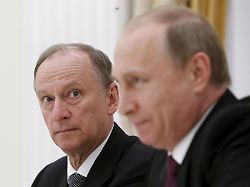Report: Bomb under wing
Putin’s right-hand man is said to be the mastermind of Prigozhin’s death
December 22, 2023, 1:29 p.m
The death of Wagner boss Prigozhin in a plane crash quickly sparked speculation that the Kremlin could be behind it. Now the Wall Street Journal is publishing a report that security guard Patrushev is said to be responsible for the attack. He is a long-time confidant of Putin.
In June, Yevgeny Prigozhin rehearses an uprising against the Russian military leadership. Two months later, the head of the Wagner mercenary group is dead. He died when his private jet crashed on the way from Moscow to St. Petersburg. Immediately after the sudden death of the influential entrepreneur became known, there was speculation that the Kremlin could be behind it. But Moscow’s leadership vehemently denies any involvement. President Vladimir Putin even says that hand grenades could have exploded on board and caused the crash.
The Wall Street Journal (WSJ) wants to have exposed these and other pseudo-explanations by Moscow as lies. In a detailed reconstruction of the events that led to the crash on August 23, the newspaper relies on information from Western intelligence services, former American and Russian security and intelligence officials, and former Kremlin officials. The result: None other than Russian security officer Nikolai Patrushev is the mastermind behind the attack. Accordingly, a small bomb was installed under a wing before Prigozhin’s private plane took off. Around 30 minutes after the plane took off, the explosive device exploded and tore off the wing. All ten people on board, including Prigozhin and Wagner official Dmitri Utkin, died.
According to consistent reports, Patrushev is one of Putin’s closest confidants. According to the WSJ, the 72-year-old is the second most powerful man in Russia. He is a former head of the FSB security service, now secretary of the Russian Security Council and is considered one of the most influential hardliners among Putin’s close advisors. The two have known each other since they worked together at the Soviet KGB in Leningrad – today’s St. Petersburg – in the 1970s.
Even before the rebellion of the Wagner mercenaries in June 2023, Patrushev perceived Prigozhin as a threat to Putin’s power, reports the WSJ. Above all, the open and vehement criticism of leading Russian military officials was a thorn in his side. Given the military successes and the importance of the Wagner Group in the war of aggression in Ukraine, Patrushev feared that the private army had acquired too much power.
Kremlin talks about “Pulp Fiction”
On June 23, Prigozhin finally instigated a full-scale mutiny. The next day, his soldiers left their positions in Ukraine and marched to Rostov-on-Don, where they wanted to confront the Russian military apparatus around Defense Minister Sergei Shoigu and Chief of General Staff Valery Gerasimov. During the day, tanks even moved towards Moscow. With the mediation of the Belarusian ruler Alexander Lukashenko, Prigozhin was finally persuaded to give in. His mercenaries entered Belarus with impunity.
Putin publicly spoke of treason, but there was a kind of truce in which Prigozhin was able to move somewhat freely. However, the emergence of such an uprising was seen as a serious challenge to Putin’s almost quarter-century-long exercise of power. The ruler obviously couldn’t let that go. According to the WSJ, Putin did not object to Patrushev’s plan to eliminate Prigozhin.
After the report became known, the Kremlin today accused the US newspaper of publishing “pulp fiction.” Kremlin spokesman Dmitry Peskov said according to Reuters, he saw the story but didn’t want to comment on it. But then he added: “The Wall Street Journal has unfortunately had a penchant for pulp fiction lately.” Moscow had previously rejected claims that Prigozhin was killed on Putin’s orders as an “absolute lie.”
If the report proves true, it would not be the first successful assassination attempt on a disgraced Russian citizen. In 2006, former secret service agent Alexander Litvinenko was killed. He fled into exile in Great Britain and drank tea that had been poisoned with the radioactive substance polonium-210. According to a British judge, Patrushev approved the murder.
